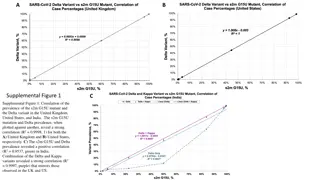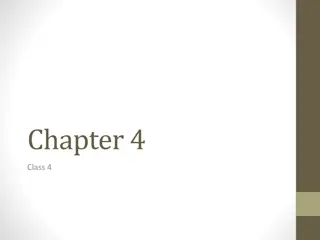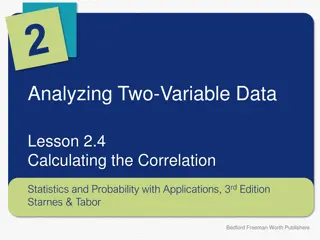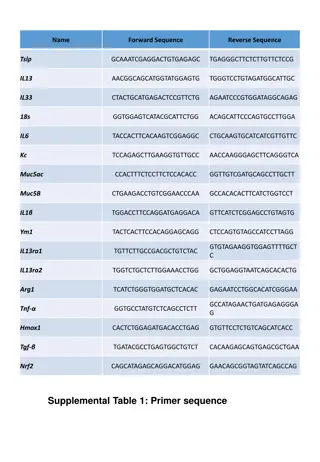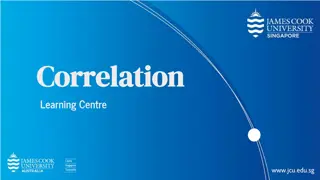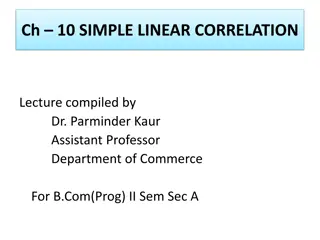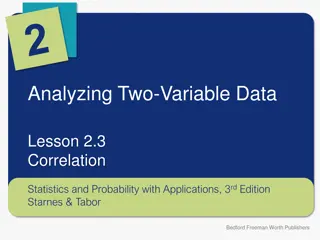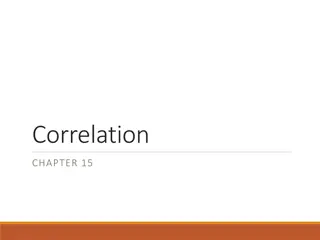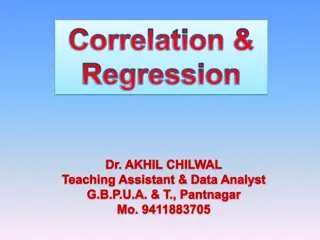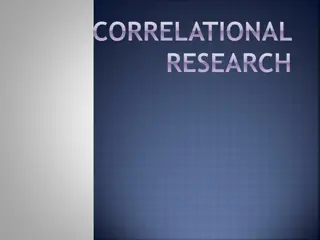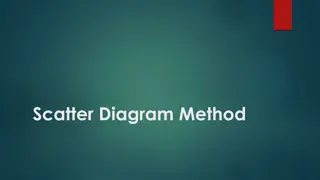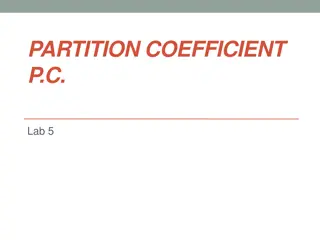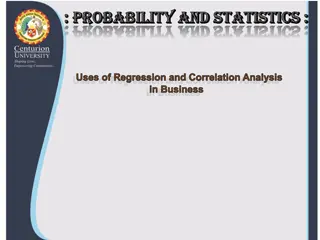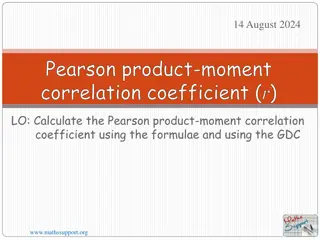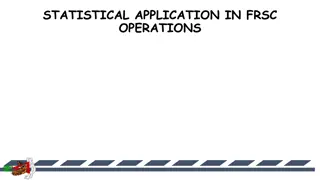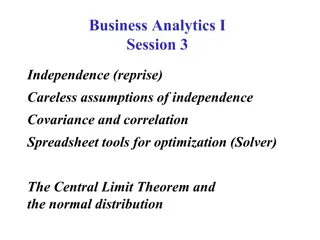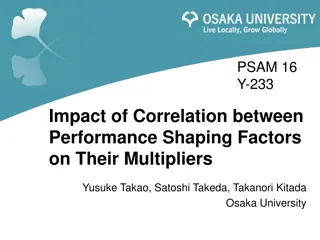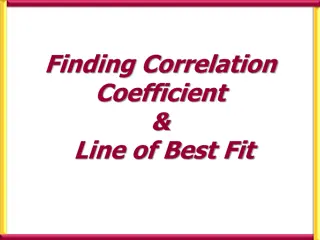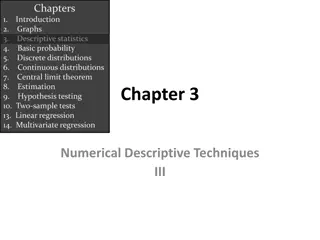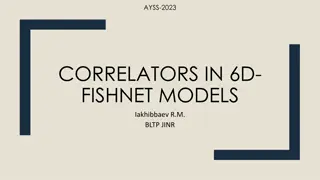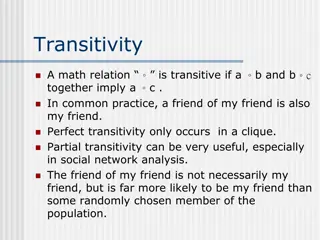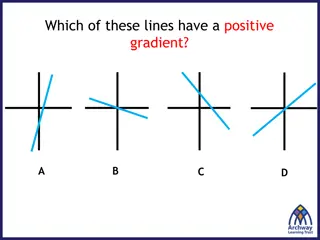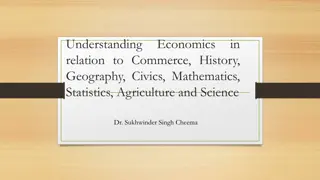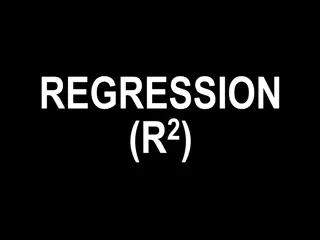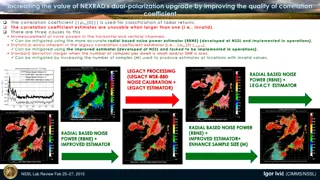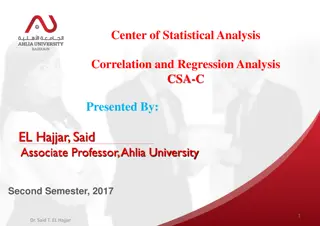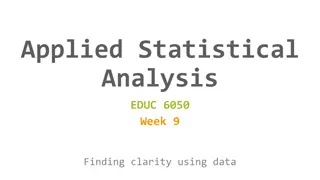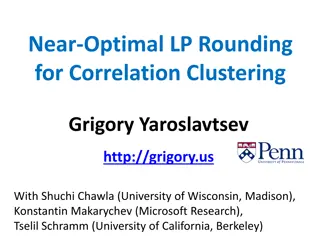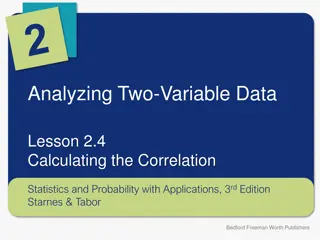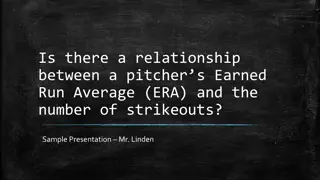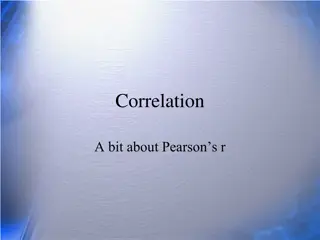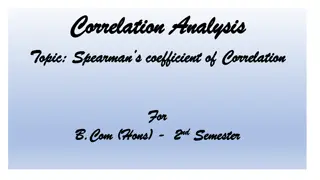Correlation of s2m G15U Mutant and Delta Variant Prevalence
The correlation between the prevalence of the s2m G15U mutant and the Delta variant in the UK, US, and India was analyzed, showing strong correlations in the UK and US, and a positive correlation in India. Analysis of the s2m phenotype in the Alpha, Delta, and Kappa variants was also conducted. Addi
3 views • 4 slides
Correlation Analysis in Statistics
Exploring the concept of correlation in statistics: from measuring the strength of linear relationships between variables to interpreting correlation coefficients and coefficients of determination. A practical example involving bass drum sales and TV appearances by a popular group illustrates how co
1 views • 23 slides
Correlation in Two-Variable Data Analysis
This content discusses calculating the correlation between two quantitative variables, its properties, and how outliers can influence the correlation. It provides a step-by-step guide on how to calculate the correlation coefficient 'r' using z-scores. Additionally, it presents a practical problem of
1 views • 18 slides
Molecular Biology Study: Primer Sequences and Correlation Analyses
This study delves into the realm of molecular biology, focusing on primer sequences for various genes like IL13, IL33, Muc5ac, and more. Additionally, it explores PCA analyses of different study groups and correlation of variables using Pearson correlation coefficient. The research sheds light on th
0 views • 4 slides
Correlation and Causation in Data Analysis
A correlation analysis assesses the relationship strength and direction between two variables using the Pearson correlation coefficient. It's crucial to differentiate between correlation and causation, where correlation indicates a relationship but not causation. Exploring examples like ice cream sa
0 views • 13 slides
Simple Linear Correlation in Commerce: Lecture Compilation by Dr. Parminder Kaur
Correlation analysis is essential in understanding the co-variation between two or more variables. This lecture compiled by Dr. Parminder Kaur, an Assistant Professor in the Department of Commerce, delves into the definition of correlation, types of correlation such as positive/negative, simple/part
1 views • 12 slides
Joule-Thomson Coefficient in Thermodynamics
The Joule-Thomson coefficient describes the relationship between temperature and pressure changes in a substance. This coefficient impacts the direction of temperature change when pressure is altered. With equations and explanations provided by U. Nithya, M.Sc., M.Phil., this summary covers the defi
3 views • 11 slides
Correlation in Two-Variable Data Analysis
Exploring the concept of correlation in analyzing two-variable data, this lesson delves into estimating the correlation between quantitative variables, interpreting the correlation, and distinguishing between correlation and causation. Through scatterplots and examples, the strength and direction of
0 views • 13 slides
Correlation in Research Designs
Research designs like experimental, quasi-experimental, and correlational serve different purposes in studying variable relationships. Correlation does not imply causation and can be positive or negative, indicating how two variables change together. The correlation coefficient quantifies this relat
5 views • 43 slides
Correlation and Regression in Data Analysis
Correlation and Regression play vital roles in investigating relationships between quantitative variables. Pearson's r correlation coefficient measures the strength of association between variables, whether positive or negative, linear or non-linear. Learn about different types of correlation, such
0 views • 26 slides
Correlational Research in Psychology
Correlational research in psychology focuses on determining the degree of relationship between variables without manipulation. It helps show the magnitude of association but not causation. Correlation coefficient indicates the existence, degree, and direction of the relationship between variables. P
0 views • 38 slides
Scatter Diagram Method for Correlation Analysis
Scatter Diagram Method is a simple and effective way to study the correlation between two variables. By plotting data points on a graph, it helps determine the degree of correlation between the variables. Perfect positive and negative correlations, as well as high and low degrees of correlation, can
1 views • 11 slides
Partition Coefficient in Pharmaceuticals
Partition coefficient (P.C.) is crucial in pharmaceuticals for various reasons such as preserving oil/water systems, drug distribution in the body, extraction processes, and dosage form formulations. It involves the distribution of a solute between two immiscible liquids based on equilibrium express
0 views • 10 slides
Applications of Regression and Correlation Analysis in Business
Regression and correlation analysis play vital roles in business, helping to quantify relationships between variables. Regression analysis estimates relationships between dependent and independent variables, while correlation analysis quantifies associations between continuous variables. These techn
1 views • 9 slides
Pearson Product-Moment Correlation Coefficient
Pearson product-moment correlation coefficient, denoted by "r," is a numerical measure of the strength and direction of a linear relationship between two variables. It ranges from -1 to +1, where 1 signifies a perfect positive linear correlation, -1 a perfect negative linear correlation, and 0 no co
0 views • 18 slides
Correlation in Quantitative Variables
Explanation of how to calculate correlation between two quantitative variables, the importance of outliers in correlation, and the impact of strength and direction on the correlation coefficient.
1 views • 26 slides
Statistical Application in FRSC Operations
In the study of central tendency and variability measures, bivariate data comes into play when relating pairs of measurements involving two variables. This lecture delves into the coefficient of correlation, which quantifies relationships between random variables. The aim is to familiarize participa
2 views • 14 slides
Correlation and Covariance in Business Analytics
Explore the concepts of covariance and correlation in business analytics to understand the relationship between random variables. Delve into how these measures help analyze dependence between variables, differentiate between independence and covariance, and interpret correlation as a dimensionless m
4 views • 27 slides
Impact of Correlation on Human Reliability Analysis
Understanding the impact of correlation between Performance Shaping Factors (PSFs) on their multipliers in the context of Human Reliability Analysis (HRA), particularly focusing on the SPAR-H method. The correlation among PSFs, such as stress, complexity, and training, is evaluated to determine how
1 views • 25 slides
Addressing Skew and Lack of Correlation in Teacher Observation and Student Growth Data
Review the data analysis process to identify root causes of lack of correlation, develop a District Data Action Plan, and follow an Application and Approval Timeline. Receive Technical Assistance to utilize data effectively, analyze potential issues affecting student achievement, and ensure teacher
0 views • 38 slides
Correlation Coefficient and Line of Best Fit
Learn how to find the correlation coefficient and create a line of best fit using statistical and regression calculations. Discover the steps involved, from setting up the calculator to analyzing the input data and determining the correlation between variables.
1 views • 14 slides
Measures of Linear Relationship in Statistics
Exploring the concepts of covariance and correlation coefficient in statistics to determine the strength and direction of linear relationships between variables. Covariance indicates the pattern two variables move together, while correlation coefficient quantifies the strength of the relationship. S
0 views • 35 slides
Exact Correlation Models in Biscalar Fishnet Theory
In the study of biscalar fishnet models, various operators and spectra were explored, leading to findings on exact correlation functions, strong coupling regimes, Regge limits, and more in arbitrary dimensions. The investigation delves into Lagrangian formulations, graph-building operators, conforma
0 views • 15 slides
Transitivity and Clustering Coefficient in Social Networks
Transitivity in math relations signifies a chain of connectedness where the friend of a friend might likely be one's friend, particularly in social network analysis. The clustering coefficient measures the likelihood of interconnected nodes and their relationships in a network, highlighting the stru
1 views • 8 slides
Correlation in Scatter Graphs
In this content, various graphs are used to demonstrate the concept of correlation in scatter graphs. It discusses positive, negative, and no correlation, showcasing how one variable affects the other. Examples and explanations are provided to help understand the relationships between different sets
0 views • 17 slides
Correlation in Economics and Education
Correlation in education refers to the technique of establishing reciprocal relationships between different subjects to enhance understanding. The etymological meaning of correlation stems from Latin roots, signifying interlinking. Various types of correlation such as vertical and horizontal correla
0 views • 33 slides
Regression Analysis in Statistical Research
Regression analysis, specifically focusing on the R2 statistic, is a method used to examine the relationship between two variables at an interval/ratio level. It evaluates how well a line fits the data and measures the strength of the relationship between independent and dependent variables. Being s
1 views • 5 slides
Enhancing NEXRAD's Dual-Polarization Upgrade for Improved Correlation Coefficients
Enhance the value of NEXRAD's dual-polarization upgrade by improving the quality of correlation coefficients, particularly focusing on the usability and accuracy of | ρ hv (0)| for radar return classification. Addressing issues with correlation coefficient estimates exceeding one is crucial for val
1 views • 6 slides
Statistical Analysis: Correlation and Regression Study by Dr. Said T. El Hajjar
In the second semester of 2017 at Ahlia University, Dr. Said T. El Hajjar presented a study focusing on correlation and regression analysis. The study investigated the relationship between independent variables PP and SS with the dependent variable TP. Through various case scenarios, the study revea
1 views • 18 slides
Correlation and Regression in Statistical Analysis
Exploring the concepts of correlation, regression, and hypothesis testing in statistical analysis to assess relationships between variables, determine effect sizes, and interpret results. Key topics include z-scores, comparing means, and the general requirements for applying correlation analysis.
0 views • 36 slides
Correlation Clustering: Near-Optimal LP Rounding and Approximation Algorithms
Explore correlation clustering, a powerful clustering method using qualitative similarities. Learn about LP rounding techniques, approximation algorithms, NP-hardness, and practical applications like document deduplication. Discover insights from leading researchers and tutorials on theory and pract
1 views • 27 slides
Correlation in Statistics
This lesson delves into calculating the correlation between two quantitative variables, exploring properties of correlation, addressing how outliers affect correlation values, and more. You will learn the steps to calculate correlation, understand its properties, and the importance of variable type
0 views • 10 slides
Pitcher's ERA and Strikeout Relationship in Baseball
An analysis was conducted to investigate the relationship between a Major League pitcher's Earned Run Average (ERA) and the number of strikeouts during the 2018 regular season. Using a simple random sample of 30 pitchers, a correlation coefficient of -0.376 was found, indicating a moderately weak ne
1 views • 10 slides
Finding Correlation Coefficient & Line of Best Fit
Analyze the correlation coefficient and determine the best fit line for your data. Understand the relationship between variables and predict future outcomes accurately. This process involves calculating the correlation coefficient value and fitting a line that represents the data trend. By interpret
0 views • 12 slides
Correlation in Data Analysis
This content discusses how scatter graphs represent data relationships, interpreting correlations, and distinguishing causation from correlation. Learn about positive, negative, and no correlation through practical examples like city population studies and salary-age comparison. Dive into the basics
0 views • 17 slides
Understanding Regression, Correlation, and PMCC
This collection of images and questions covers topics related to regression analysis, correlation, and the Product Moment Correlation Coefficient (PMCC). Explore concepts such as plotting data to form straight lines, rearranging equations for linear relationships, interpreting correlation coefficien
0 views • 15 slides
Linear Regression Analysis and Correlation Techniques
Learn about correlation and regression analysis in statistics for business, where you explore the relationship between variables through scatter plots, examine patterns, identify outliers, and calculate correlation coefficients to measure the strength of associations. Understand the properties of co
0 views • 56 slides
Understanding Pearson's Correlation Coefficient and Its Applications
Explore the concepts of positive and negative correlations, Fisher r to z transformation, range restriction, range enhancement, and the impact of reliability on correlation coefficient. Discover why ANOVA data may not imply causality and the importance of sampling distribution of correlations.
1 views • 30 slides
Understanding Correlation in Statistics
Learn about correlation in statistics, from its definition to interpretation. Discover how correlation measures the strength of linear relationships between variables, the difference between positive and negative correlation, and why a correlation of 0 doesn't imply independence. Get insights into h
0 views • 20 slides
Spearman Rank Correlation Analysis: Understanding and Application
Learn about Spearman's coefficient of correlation, its importance in analyzing the strength and direction of associations between ranked variables, and the process of ranking data systematically to calculate the Spearman rank correlation coefficient. Explore how to interpret the coefficient values a
1 views • 13 slides
